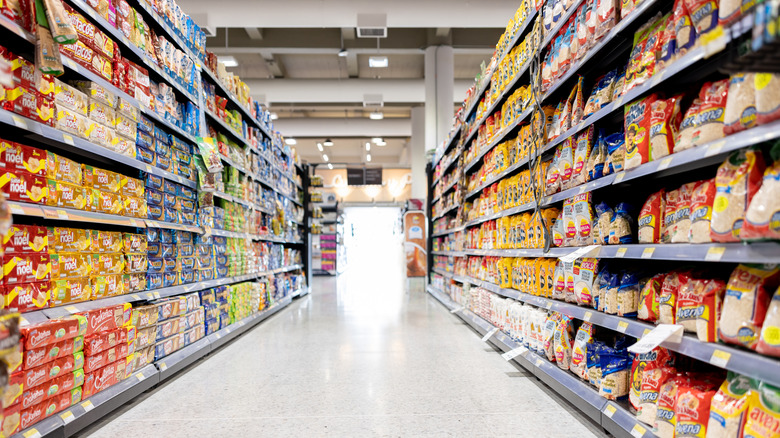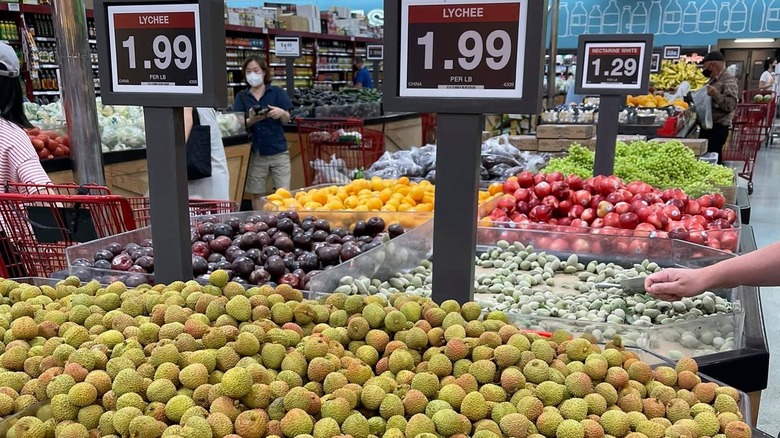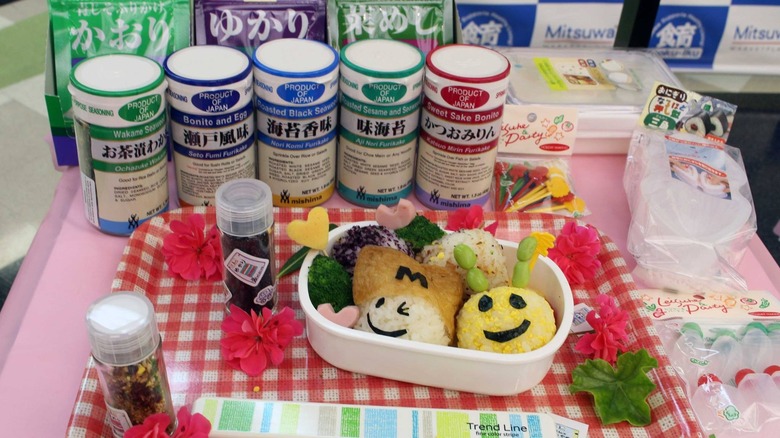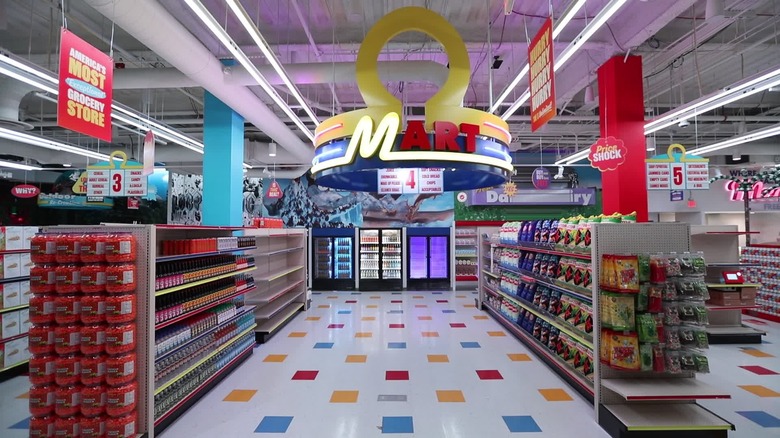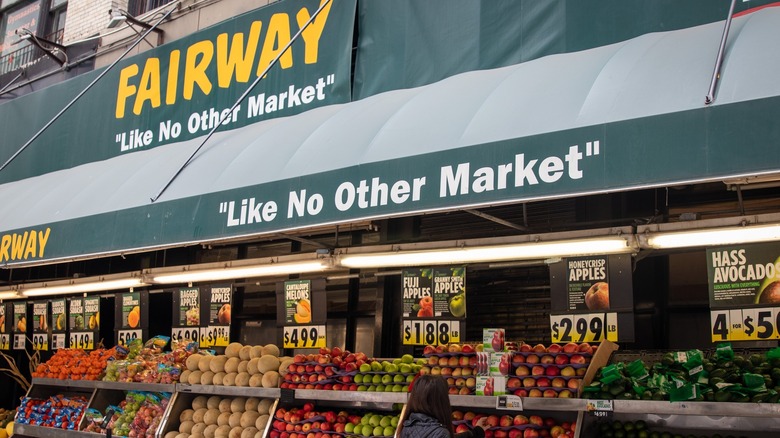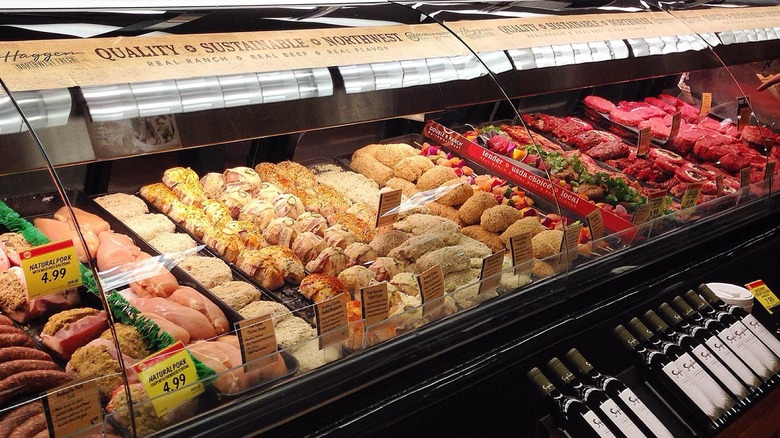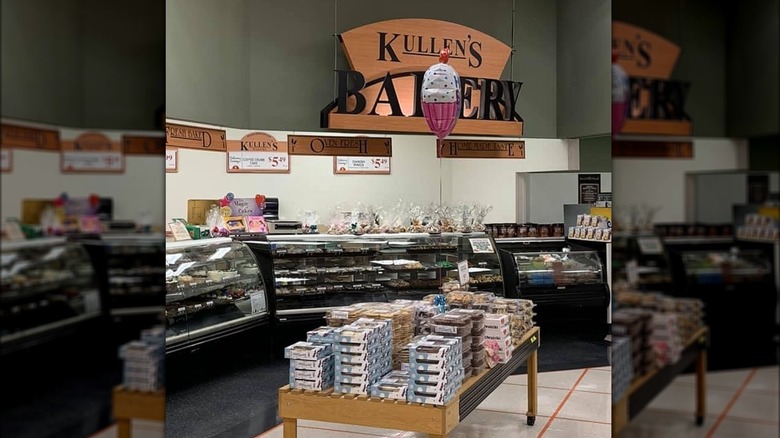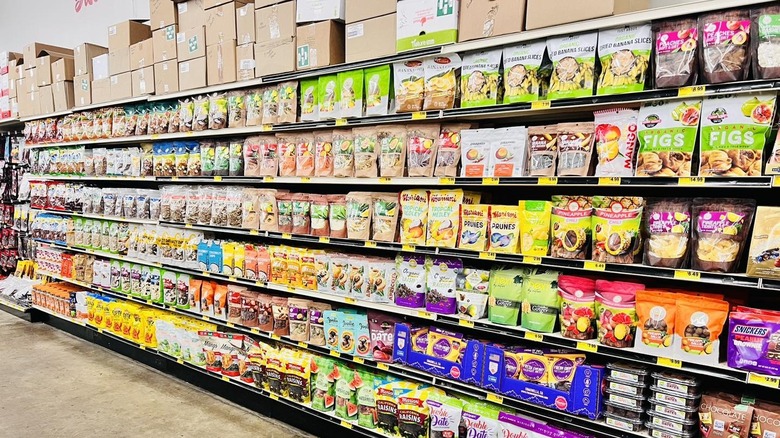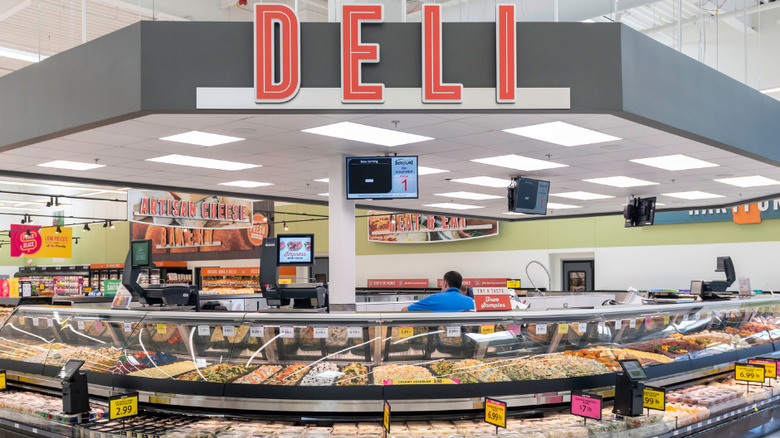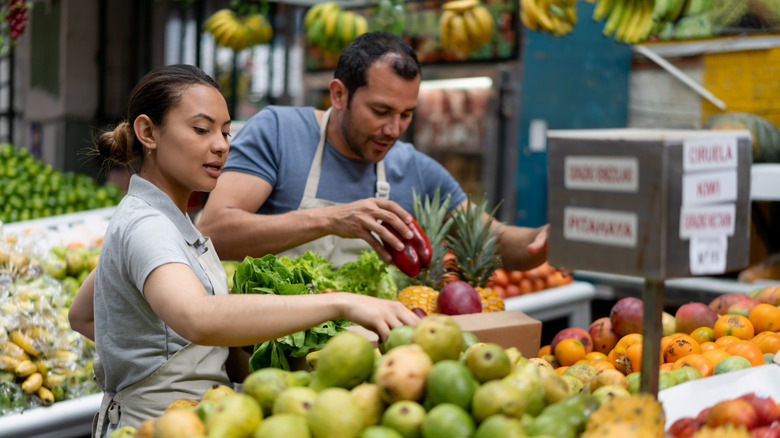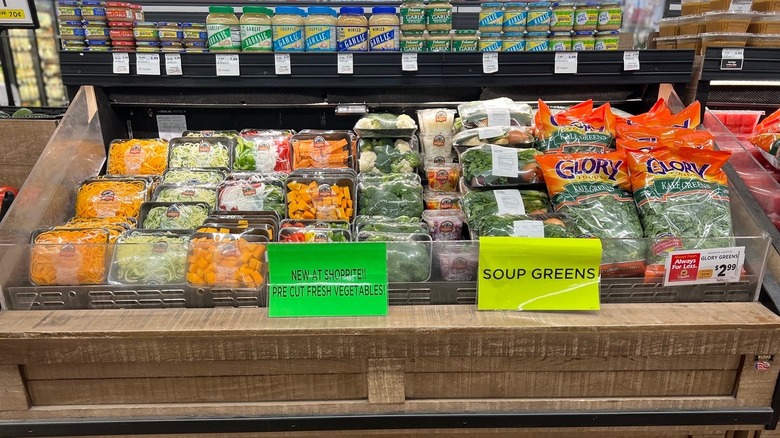Grocery Stores You'll Wish You Knew About Sooner
They keep our kitchens stocked and our bellies full, we stop at them multiple times per week, and quite frankly, it's hard to imagine life in the 21st century without them. That's right, we're talking about grocery stores. Beginning with mom-and-pop shops in the 18th century up to the retail giants of today, food markets are an integral part of American society.
According to GOBankingRates, monthly grocery costs per individual in the U.S. range between $250 to $550. There's no denying that a large chunk of our paycheck goes toward the places that sell our canned goods, fruits, vegetables, meats, and cheeses. With many of the dominating industry players like Costco, Walmart, or Kroger visible at every corner, it's easy to look right past those smaller markets and grocers sprinkling the thousands of cities and towns across the nation.
But these hidden food-toting gems are indeed out there — many of them bringing interesting histories, unique edible selections, bizarre sceneries, or heartwarming intentions to the table. Check out our list of grocery stores you'll wish you knew about sooner.
Jungle Jim's International Market
What if your weekly shopping trip was a true experience, one as exciting as taking a stroll through a mystifying museum exhibit or a colorful, animated zoo? Is it possible to slowly walk through the aisles of a grocery store, without rushing to toss all the necessary items into your cart as quickly as possible before making a beeline for the exit?
At the two Jungle Jim's International Market locations in Ohio, this reality is not only possible — it is guaranteed. As you stop to admire, appreciate, and ogle the animatronic animals, singing characters, waterfalls, and soup cans on swings throughout the spacious aisles, it is easy to glance down at your watch and realize you've spent far longer than you intended admiring the stunning set-ups.
But Jim's is not just a pretty face; in addition to being visually unforgettable, the place offers classes, tastings, and scheduled festivals throughout the year. You'll find an impressive selection of international products from a whopping 70 countries, as well as an extensive wine and liquor selection. A stop-in at Jungle Jim's is an indelible experience, but make sure you don't forget your list when you go. With all the visual distractions, there's no way you're going to remember the items you originally came to get.
Super King
As a leader in international foods, shoppers searching for something different in their weekly grocery run need look no further than Super King, a small chain operating out of Southern California. Meats, rice, grains, imported chocolate, and exotic produce from around the world — including an international ice cream section, a giant scoop-your-own nuts bar, and a deli featuring delicacies like caviar and cheese — all serve to celebrate multiculturalism.
But perhaps what we love the most about Super King is that its shopper base is every bit as varied as its products. The Golden State is a melting pot of ethnicities, languages, and cultures, and Super King values and reflects this fact. In a Reddit thread discussing the beloved local market, one shopper shared their heartwarming experience in the produce section. Okra had just been put out, so the shopper naturally wandered over to admire its freshness. A handful of other people walked over to do the same, and soon after there was a small crowd surrounding the vegetable bin. Everyone was happily chatting, reciting the word for the vegetable in their native languages, and sharing home remedies and recipes. "Super King makes me proud to be an American," the user said. The praise doesn't get much better than that.
Mitsuwa Marketplace
It can admittedly be difficult to find delicious and authentic Eastern food products in the West. But while ramen, miso, mochi, bitter melon, or shogayaki sauce, among others, are not exactly abundant in the aisles of American grocery stores, one smaller chain's business model is built entirely upon these less common products. Mitsuwa Marketplace is about as close to shopping in Japan as you can get without actually hopping on a plane. Its twelve shops located in California, Hawaii, Texas, New Jersey, and Illinois offer customers a chance to leave with a cart full of imported Japanese products.
White nectarines and brown pears lay stacked in the produce section, while bags of rice from Hokkaido, cooking sake, and dried fish litter the shelves of the brightly-colored aisles. Its locations also have food courts operating within, so a hot meal of soba noodles or a sushi party tray for your next gathering are always available for pick-up. You might leave with shrimp chips for your weekly snack or Japanese mayo to spread on your lunchtime sandwiches. Either way, a stop at Mitsuwa can serve to expand your culinary horizons as well as your knowledge of another country — or, if your roots are found in Japanese culture and cuisine, it will bring you a nostalgic taste of home.
Omega Mart
What is it about fun houses that appeal to us? Perhaps it's the artistic influences or the strange perspectives that challenge our senses. Maybe it's the hidden doors and passageways, the lack of predictability in an otherwise predictable world. One thing we know for sure is that a grocery store trip is straightforward — but what if it wasn't? What if someone took the concept of food aisles and turned it into a fun house encounter?
Everyone should experience Omega Mart in Las Vegas once in their lives. A market turned mind-bending immersive art experience, fridges open and shelves peel back to become portals and passageways to other parts of the store or hidden exhibitions and rooms. The many shelves, at first, appear stocked with standard ingredients, just like any other grocer ... until you look a little closer. Tattooed chicken and moth's milk are just a few of the unreal products waiting for you in-store. Sliced deli meats are arranged to look like famous faces and fresh produce is transformed into an array of instruments for making music.
And the best part? Everything is actually for sale; so you can take your can of Meat Grass, purchase it as a memento, and still eat it later on at home. As for how it tastes ... well, we'll let you be the judge of that. Tickets beginning at $49 ($39 for locals as of September 2023) are required for entry into this miniature alternate universe, so plan accordingly.
Fairway Market
Fairway Market is one of those places you just want to see be successful due to the sheer grit and hard work of its creators. Beginning as a single roadside produce stand in Manhattan in the 1930s, Nathan Glickberg and his son Leo worked until they outgrew their simple model and moved into a storefront space. Now, Fairway is a mid-sized chain with locations sprinkled across the Northeast. It is known for its amazing selection of cheeses, certified organic produce, excellent seafood, meat department ... and, perhaps most of all, its olive oil selection.
This is because each Fairway location has an olive oil tasting bar set up and ready for shoppers to sample. A cube-like structure with rows of small clefts built into the sides serves as the vessel for as many as 36 different types of olive oils at any given point. Each of the tiny compartments is filled with a different pick, while crunchy toasted baguettes for dipping are placed right alongside. As you walk by on your way to visit the many departments, feel free to pick up a slice of bread and taste as many of the wide selection of oils as you want — there's no limit. Whether you want to try Spanish or Greek, you're likely to find it at Fairway.
Haggen
There is something about the concept of one's food being produced locally that is undeniably attractive. Knowing that the salmon fillet gracing your table was freshly caught by a fisherman just a few miles down the road is a priceless culinary notion — one that most of us would like to experience more frequently. Unfortunately, it can be difficult to find large-scale markets that adhere to a business model focusing on locally sourced products.
But the people of Washington State have a gem of a grocer to be found in Haggen, a small regional grocery chain that opts for fresh, Northwestern meat, produce, and plants as much as it can. Everything from its beef to its garden greenery is homegrown and raised in the local area, supplied by farms and ranches operated by hardworking families. With an impressive selection of health foods, including certified organic and gluten-free options, Haggen becomes a top shopping option for people looking for healthy alternatives who oftentimes run into hurdles trying to find what they need at regular markets. However, the phrase "you get what you pay for" definitely applies here; Haggen has a bit of a reputation for being pricey, so bear this in mind if planning a stop-in.
King Kullen
What defines supermarkets as we know them? Huge, spacious buildings, big parking lots, separate departments for different categories of products, and discount pricing, to name a few. But the massive food sellers that we now see as being commonplace didn't used to exist at all. This is what makes this particular grocer so important; it is recognized as having been the first to include all of these criteria in its business model.
Credited by the Smithsonian Institute as being the first grocer to define the modern idea of "supermarket," King Kullen opened its doors in 1930 in Long Island, New York. It was a huge success, quickly growing to 17 different locations across the state. Now, nearly a hundred years later, the company has close to 30 locations and is still family-owned and operated — a circumstance so rare in today's day and age that it makes you want to run to the nearest store in support of the generational business.
In case you want another reason to visit one of America's original supermarkets, its stores boast a plethora of products at very reasonable prices. King Kullen's website even features a "Ways To Save" tab, where customers can find coupons and regularly updated tips on deals. We'll certainly never turn down the opportunity for extra savings.
Grocery Outlet
Let's face it — groceries are expensive. And with a percentage of Americans struggling to afford adequate food, having cost-effective options is incredibly important. Cue Grocery Outlet, a nationwide chain with over 400 locations that is considered to be the country's largest super-bargain retailer. "Here in the SF Bay Area it's extremely helpful," said one user on Reddit under r/GroceryOutlet. "We find great deals on snacks my kids like, and especially things like cheese, yogurt, hummus, desserts. Sabra hummus is frequently 97-cents per container."
A number of unique strategies make it possible for the company to keep its prices low for consumers — namely, a combination of smart purchasing. Grocery Outlet jumps on closeout products that other retailers want quickly off their shelves for seasonal reasons, excess stock, and so on. Because the food is acquired at such a deal, the Outlet can then make it a bargain for you — the customer. The next time you need to fill your pantry on a budget, consider stopping in at your nearest Grocery Outlet to keep your food bill low.
Festival Foods
The Midwest is often called America's Heartland for its important and ongoing contributions to both farming and industry, its overlapping networks of small towns and happening cities, and its consistently friendly population. This overall homey, good-natured feeling extends to Midwestern food: in a hot, cozy mug of Caribou Coffee, a melt-in-your-mouth chocolate scone from Dunn Brothers ... or a ready-made meal from Festival Foods.
This Wisconsin-based small chain of grocery stores not only provides local produce, fresh meat, and seafood, but it also prepares meals for its busy shoppers. Each week the company posts its updated menu online, inviting customers to stop in and grab a nutritious dish for a quick weeknight dinner — without restaurant take-out prices. Creamy pans of pasta, seasoned roasted chicken, or veggie-stuffed pot pies lie in wait for those who stop in.
But wait, there's more. Festival Foods also provides virtual cooking classes for adults and children run by a team of meal mentors. Fostering self-sufficiency and healthy lifestyles through food and cooking is something we can all get behind.
El Super
In recent years, Hispanic-Americans have become the second largest ethnic group in the United States, making up about 20% of the total population — a staggering statistic when you consider that in 1970, this percentage sat at around 5%. All of this growth brings with it different elements of interlocking culture, including food.
While you're probably able to find the commonplace American brands of tortillas or salsas at any given grocery store, you'll likely be hard-pressed to find more specialized Latin-American items. And when you start searching for items like mango nectar, pan dulce, or queso fresco — which for a huge chunk of people, are considered to be a necessary taste of home — you'll be met with nothing but empty aisles when it comes to most major retailers.
But El Super, a Southwestern string of markets specializing in Hispanic products, has dedicated itself to closing that gap. Offering sweets, spices, produce, and beverages traditionally sold in Mexico and South America, the affordable market brings a collection of products to the U.S. that much of its clientele may have left behind. In addition, the company's signs and labels are all written in Spanish, and its workers are usually bilingual, breaking down the challenge of language barriers and therefore increasing the feeling of comfort for its shoppers.
ShopRite
Corporate social responsibility, or actions taken by an organization to enhance the quality of the community in which it functions, is hugely important. Successful companies often have the platform and the necessary financial ability to affect major change — but how often do they actually cut into their funds to do so?
This is what makes ShopRite, a New Jersey-based grocery chain, so special. The goal for profits, as it states on its website, is to reinvest in the community. This is apparent when you read over the list of commendable non-profit organizations with which it works and helps support: the Special Olympics, Partners In Caring, community food banks, and local school districts, to name a few.
So the next time you're crafting your grocery list and deciding where you're going to stop to pick up your favorite cereal for the week, consider spending your hard-earned food money at a place that promises to use it to help others without the same means to access food. Because by making small, conscious decisions like this — even as consumers — we can help to affect change, too.
